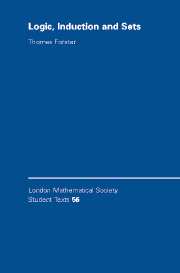Preface
Published online by Cambridge University Press: 05 June 2012
Summary
When there are so many textbooks on logic already available, an author of a new one must expect to be challenged for explanations as to why he has added to their number. I have four main excuses. I am not happy with the treatments of well-foundedness nor of the axiomatisation of set theory in any of the standard texts known to me. My third excuse is that, because my first degree was not in mathematics but in philosophy and music, I have always been more preoccupied with philosophical concerns than have most of my colleagues. Both the intension-extension distinction and the use-mention distinction are not only philosophically important but pedagogically important too: this is no coincidence. Many topics in mathematics become much more accessible to students if approached in a philosophically sensitive way. My fourth excuse is that nobody has yet written an introductory book on logic that fully exploits the expository possibilities of the idea of an inductively defined set or recursive datatype. I think my determination to write such a book is one of the sequelæ of reading Conway's beautiful book (2001) based on lectures he gave in Cambridge many years ago when I was a Ph.D. student.
This book is based on my lecture notes and supervision (tutorial) notes for the course entitled “Logic, Computation and Set Theory”, which is lectured in part II (third year) of the Cambridge Mathematics Tripos.
- Type
- Chapter
- Information
- Logic, Induction and Sets , pp. vii - viiiPublisher: Cambridge University PressPrint publication year: 2003



